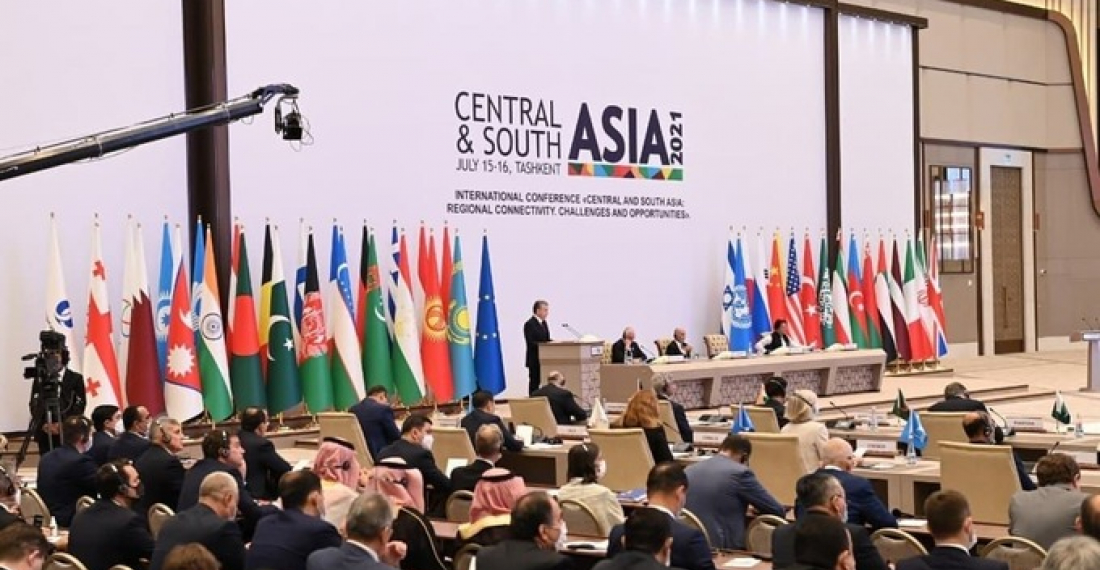The president of Uzbekistan, Shavkat Mirziyoyev, spoke of the need for the revival of mutual ties in Central and South Asia, where about two billion people live today. Mirziyoyev was speaking at the start of one of the largest international events to take place in the Uzbek capital for decades. Regional and world leaders are attending the International Conference “Central and South Asia: Regional Interconnectedness. Challenges and Opportunities”, including high level officials from the EU and the US, the president of Afghanistan, the prime minister of Pakistan, the foreign ministers of the Central and South Asian countries, and delegations from 44 countries and about 30 international organisations.
Ongoing concerns about developments in Afghanistan, and issues related to stability in that country and its impact on Central Asia feature prominently in the conference. President Mirziyoyev in his opening speech emphasised the need to strengthen confidence and good-neighbourliness of the states of Central and South Asia; the creation of stable trade, and economic, transport and communication ties, ensuring security and stability; and support for a peaceful settlement in Afghanistan.
“Today Afghanistan is at a turning point in its modern history. We are confident that the wise Afghan people will show a willingness to compromise in order to achieve the national consensus. Comprehensive support by the international community for a political settlement of the conflict in the name of the long-awaited peace on Afghan soil is of fundamental importance. This will open up new prospects for the integration of Afghanistan into regional processes,” Shavkat Mirziyoyev said.
The conference is seen as the first major attempt by Uzbekistan to play a more prominent regional and international role and is part of President Mirziyoyev's policy of opening up the country for broader international co-operation. Mirziyoyev has been president of Uzbekistan since 2016, and under his leadership the country has been slowly implementing a programme of ambitious reforms, putting behind it years of isolation. Presidential elections are due to be held in Uzbekistan in October.
During Friday's conference, the Uzbek president made a serious of tangible proposals which he said he hoped the conference will endorse as part of a roadmap for the future. They relate to the creation of modern, efficient and safe transport and logistics infrastructure in Central and South Asia; food security; environment and digital platforms, tourism, as well as expansion of scientific, cultural and humanitarian exchanges.
Prominent in the proposals is the consolidation of efforts in the fight against common challenges and threats to stability and security. “Together we will be able to more effectively resist terrorism, extremism, transnational crime, including in cyberspace,” Shavkat Mirziyoyev said.
President Mirziyoyev also proposed to create a permanent international expert pool of prominent scientists and researchers to promote regional co-operation. The president said that there should be an annual economic forum to be a basis to increase co-operation between Central and South Asia, and wider Eurasia.
The European Union is represented in the conference by the high representative for foreign affairs and security policy, Josep Borrell. On Friday in Tashkent, Borrell also held a bilateral meeting with the Pakistani prime minister, Imran Khan. He later tweeted:
Opportunity to meet with Prime Minister of Pakistan @ImranKhanPTI in the margins of the Tashkent #Connectivity Conference. Discussed security challenges and impact of instability on the region. A peacefully negotiated settlement in Afghanistan is the only way forward. pic.twitter.com/5Ze75dAP6W
— Josep Borrell Fontelles (@JosepBorrellF) July 16, 2021







